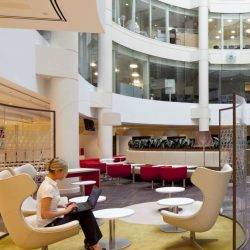October 6, 2017
Technology will create a brave new world for corporate real estate
 In their new industry report, A Brave New World: Innovating Real Estate, Holtby Turner Executive Search explore the ways innovation and digital disruption are impacting corporate real estate. The report sets out to examine real estate’s relationship to technology, and technology’s relationship to innovation. Insights on leadership through the uncertainty of digital disruption are covered in chapters from well known PropTech influencers such as Antony Slumbers, Faisal Butt and James Dearsley alongside interviews with real estate leaders from Hammerson, PGIM, M7, CBRE and Workspace Group. According to Antony Slumbers: “the days of IT are over: every business is a technology business. The differentiator going forward is knowing which technologies you can use to complement your human ingenuity, skills and creativity in the service of a robust, solid and scalable business.”
In their new industry report, A Brave New World: Innovating Real Estate, Holtby Turner Executive Search explore the ways innovation and digital disruption are impacting corporate real estate. The report sets out to examine real estate’s relationship to technology, and technology’s relationship to innovation. Insights on leadership through the uncertainty of digital disruption are covered in chapters from well known PropTech influencers such as Antony Slumbers, Faisal Butt and James Dearsley alongside interviews with real estate leaders from Hammerson, PGIM, M7, CBRE and Workspace Group. According to Antony Slumbers: “the days of IT are over: every business is a technology business. The differentiator going forward is knowing which technologies you can use to complement your human ingenuity, skills and creativity in the service of a robust, solid and scalable business.”









 One in three (31 percent) commercial real estate investors say that the UK remains their preferred region to invest in, with a figure that has remained the same since June 2016 despite the UK deciding to leave the European Union in that period. While a quarter (24 percent) of real estate investors favour Germany as their location of choice for commercial real estate opportunities; however, according to the latest BrickVest commercial property investment barometer this represented a fall from 28 percent in June 2016. More than one in five (21 percent) selected the US, the same as last June, while France saw an increase from 13 percent in June 2016 to 15 percent in June this year. The Barometer also revealed that French, German and US investors are more favourable towards the UK since June last year. Nearly a quarter (24 percent) of French, a fifth (19 percent) of German and 23 percent of US investors suggested they prefer the UK in June this year, representing an increase from last year across the board from 22 percent, 18 percent and 20 percent respectively.
One in three (31 percent) commercial real estate investors say that the UK remains their preferred region to invest in, with a figure that has remained the same since June 2016 despite the UK deciding to leave the European Union in that period. While a quarter (24 percent) of real estate investors favour Germany as their location of choice for commercial real estate opportunities; however, according to the latest BrickVest commercial property investment barometer this represented a fall from 28 percent in June 2016. More than one in five (21 percent) selected the US, the same as last June, while France saw an increase from 13 percent in June 2016 to 15 percent in June this year. The Barometer also revealed that French, German and US investors are more favourable towards the UK since June last year. Nearly a quarter (24 percent) of French, a fifth (19 percent) of German and 23 percent of US investors suggested they prefer the UK in June this year, representing an increase from last year across the board from 22 percent, 18 percent and 20 percent respectively.













 Amos Tversky and Daniel Kahneman introduced the concept of Loss Aversion in 1984, highlighting people’s tendency to strongly prefer avoiding losses to acquiring gains. Most studies suggest that losses are twice as powerful, psychologically, as gains. Lose £100 and we will feel a remorse that easily outweighs winning £100. In a similar fashion we find it very hard to see future positives when confronted with short term loses. We understand easily what we have lost but cannot imagine what there is to be gained. Furthermore, as Frederic Bastiat wrote in an 1850 paper, “That Which is Seen, and That Which is Not Seen”, man has a tendency to “pursue a small present good, which will be followed by a great evil to come, rather than a great good to come, at the risk of a small present evil”. Put these together and it is no wonder that, by and large, the future of work, corporate real estate and the workplace is so widely misunderstood.
Amos Tversky and Daniel Kahneman introduced the concept of Loss Aversion in 1984, highlighting people’s tendency to strongly prefer avoiding losses to acquiring gains. Most studies suggest that losses are twice as powerful, psychologically, as gains. Lose £100 and we will feel a remorse that easily outweighs winning £100. In a similar fashion we find it very hard to see future positives when confronted with short term loses. We understand easily what we have lost but cannot imagine what there is to be gained. Furthermore, as Frederic Bastiat wrote in an 1850 paper, “That Which is Seen, and That Which is Not Seen”, man has a tendency to “pursue a small present good, which will be followed by a great evil to come, rather than a great good to come, at the risk of a small present evil”. Put these together and it is no wonder that, by and large, the future of work, corporate real estate and the workplace is so widely misunderstood.







August 23, 2017
I’ve got some real estate here in my bag
by Paul Carder • Comment, Flexible working, Property, Technology
We’ll marry our fortunes together.
I’ve got some real estate
Here in my bag.
So we bought a pack of cigarettes,
And Mrs. Wagner’s pies,
And walked off
To look for America.
“Kathy”, I said,
As we boarded a Greyhound in Pittsburgh,
Michigan seems like a dream to me now.
(more…)